As the world grapples with climate change and environmental degradation, industries across the globe are being called upon to reduce their carbon footprints. The airline industry, with its significant carbon emissions and waste production, is no exception. Because of this initiative, many airlines are pioneering innovative sustainability and waste reduction approaches, leading the charge toward a more eco-friendly future. This blog explores four ways airlines can achieve this goal by adopting a comprehensive approach to onboard catering services.
Airline Catering Waste Management:
The Next Frontier for Cost Savings and Customer Satisfaction
Airlines are constantly seeking ways to manage costs while enhancing the passenger experience. With sustainability and efficiency becoming central to business strategies, airline catering waste management has emerged as a critical area for innovation. Airlines can significantly reduce waste, cut costs, and improve customer satisfaction by focusing on accurate forecasting, understanding customer preferences, and leveraging advanced analytics. Moreover, reducing the amount of food carried onboard has the added benefit of lowering fuel consumption, reducing costs, and mitigating environmental impact.
1. Better Accuracy in What to Board
The foundation of efficient catering waste management lies in accurately forecasting passenger numbers. Airlines traditionally rely on historical data and manual calculations to estimate how much food to board, but this method could be more precise, leading to over-catering or shortages. Over-catering results in wasted food, unnecessary costs, and increased fuel consumption due to the extra weight. Under-catering can disappoint passengers and damage an airline’s reputation.
To address this, airlines must invest in better forecasting tools that leverage real-time data and advanced analytics. According to a report by IATA, accurate passenger forecasts can reduce waste by up to 15%. By integrating machine learning algorithms, airlines can more accurately predict passenger numbers by analyzing booking patterns, seasonal trends, and weather conditions. This, in turn, allows for more precise food quantity forecasting, ensuring that the right amount of food is prepared and boarded.
Accurate boarding not only reduces food waste but also decreases the aircraft’s total weight—every kilogram of weight saved results in less fuel required for the flight. According to the International Air Transport Association (IATA), reducing onboard weight by just 1% can result in fuel savings of up to 0.75% per flight. These savings are significant, especially when multiplied across an airline’s entire fleet, leading to substantial cost reductions and a lower environmental footprint.
2. Know What Your Customers Want
Understanding passenger preferences is crucial for reducing catering waste and enhancing customer satisfaction. Traditionally, airlines have used a one-size-fits-all approach to onboard catering, often leaving food items untouched. However, with the rise of data analytics and direct-to-passenger engagement, airlines can now tailor their offerings to meet specific passenger needs.
AI-based forecasting tools can analyze data from past flights, passenger demographics, and even social media trends to predict what passengers are likely to consume onboard. For instance, a study published in the Journal of Air Transport Management highlighted that personalized meal options could reduce waste by up to 30%. Additionally, offering pre-order capabilities through airline apps or websites allows passengers to choose their meals in advance, ensuring that only the desired items are prepared and boarded.
This tailored approach reduces waste and optimizes the weight carried on board, contributing to fuel efficiency. When passengers receive exactly what they want, airlines can avoid the unnecessary weight of unconsumed food, further enhancing fuel savings and reducing the overall environmental impact.
3. Measure What Was Consumed
Airlines must measure what was consumed on each flight to continuously improve catering operations and feed this data into their forecasting models. Historically, this process has been manual and prone to errors, but modern technology offers more accurate and efficient solutions.
Digital tracking tools can automatically record what items were consumed and what was left over, providing valuable insights into passenger preferences. This data can refine future forecasts, reducing the likelihood of waste. For example, Lufthansa has implemented a digital system that tracks onboard food consumption in real-time, leading to a 20% reduction in catering waste.
Understanding passenger consumption increases forecast accuracy and reduces waste. However, accurately measuring consumption on a large scale remains one of the biggest challenges to overcome in food-related waste reduction. This cannot be resolved by one party in the ecosystem alone.
4. Collaborate Across the Supply Chain
Effective catering waste management requires collaboration among all participants in the supply chain, including airlines, caterers, software and technology providers, and airline equipment manufacturers. Each player has a role to play in minimizing waste and enhancing efficiency.
Airlines must work closely with caterers to ensure food is prepared and delivered according to precise specifications. Technology providers can offer tools for better forecasting, real-time tracking, and data analysis, while equipment manufacturers can design more efficient storage and serving solutions that reduce waste.
A study by the World Wildlife Fund (WWF) emphasizes the importance of a collaborative approach, noting that a coordinated effort across the supply chain can reduce airline catering waste by up to 50%. By fostering partnerships and sharing data, all stakeholders can contribute to more sustainable and cost-effective catering operations.
Conclusion
Airline catering waste management is both an operational challenge and a strategic opportunity for airlines to reduce costs, improve customer satisfaction, and enhance sustainability. By focusing on accurate forecasting, understanding customer preferences, measuring consumption, and collaborating across the supply chain, airlines can transform their catering operations and set new standards for efficiency and sustainability.
Moreover, the reduced onboard food waste correlates directly with decreased aircraft weight, leading to fuel savings and a reduced environmental impact. As the aviation industry continues to evolve, those airlines that embrace these practices will reduce waste and gain a competitive edge in the market. The next frontier in airline operations is clear: it’s time to tackle catering waste management head-on so airlines can soar towards a greener future.
